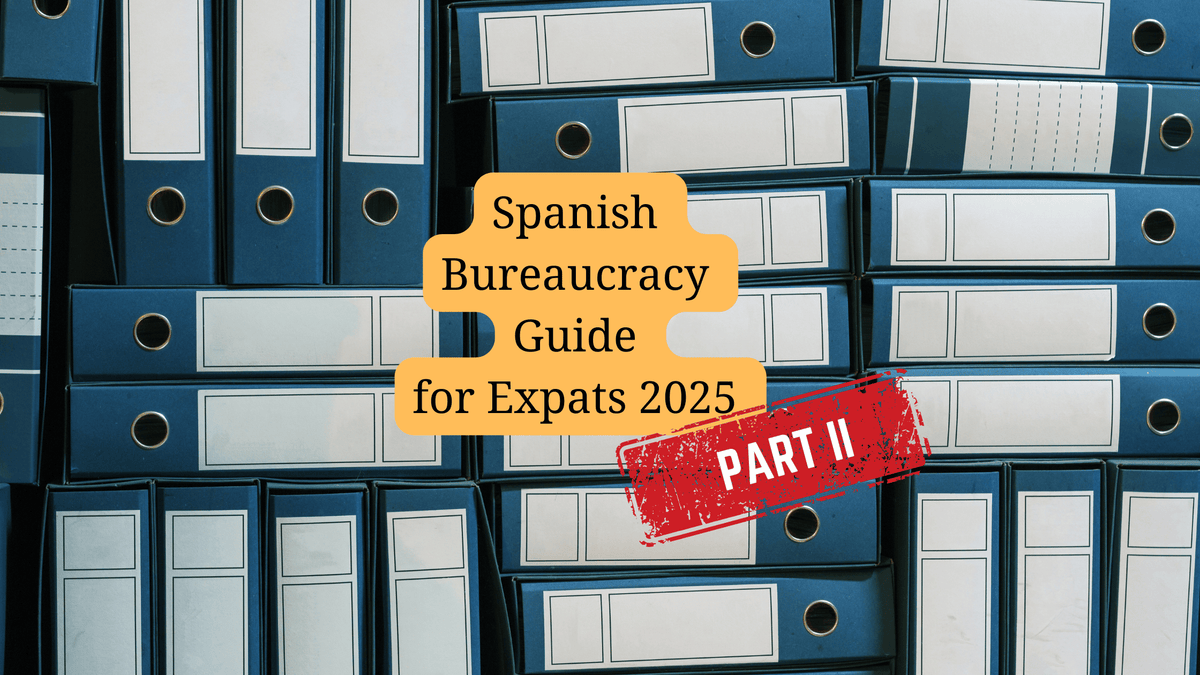
Surviving Spanish Bureaucracy Part II: Spain Expat Admin Guide 2025
|
|
Time to read: 3 min
|
|
Time to read: 3 min
If you’ve made it through Part I of our 2025 expat admin guide , you already know how to handle taxes, get a social security number, and understand state pensions in Spain. But paperwork doesn’t stop there!
If you're planning to live, work, or retire in Spain , you’ll also need to deal with residency permits, driving licenses, fines, legal documents, and university degree recognition —all essential steps to making your move official.
We aim to make life easier for people willing to move to Spain and start from scratch—to live, study, work, retire, or build a future on the peninsula.
Whether you need to apply for an NIE or TIE, exchange your UK/US driving license, legalize documents for marriage or a visa, or get your foreign degree recognized , this guide will break it all down in simple terms.
So, grab a coffee, take a deep breath, and let’s dive into the next steps in making your Spanish life official !
What is it?
The government agency that manages driving licences, registering vehicles and fines in Spain.
Main Function
If you're an expat from the UK or US planning to drive in Spain, you'll have to deal with DGT sooner or later. The first challenge is your driving license:
UK license holders must exchange theirs for a Spanish one within six months of residency, while US citizens typically need to pass a Spanish driving test.
The DGT also manages vehicle registrations, so if you're bringing your own car to Spain, you'll need to get it registered, insured, and pass the ITV (Inspección Técnica de Vehículos), Spain's version of an MOT.
What is it?
The main law enforcement body responsible for immigration procedures, including issuing NIE and TIE cards.
Main Function
When you first arrive in Spain, one of the first things you do is go to the Policía Nacional.
They're the ones who give you the NIE (Número de Identidad de Extranjero), which you'll need for everything from renting a flat to opening a bank account, working and paying taxes.
If you're not from the EU, you'll also need to apply for a TIE (Tarjeta de Identidad de Extranjero), which is the physical residency card that proves you're legally staying in Spain.
What is it?
The government office deals with criminal background checks, marriage certificates and apostilles for legal documents.
Main Function
If you're moving to Spain for work, residency, or a visa application, you might need to provide a criminal record certificate (Certificado de Antecedentes Penales).
You can get this from the Ministry of Justice (or online if possessing a digital authorization), but if it's from your home country, you'll often need to get it legalized by the Spanish Embassy or Consulate.
If you're planning to get married in Spain, you'll also need to submit documents proving you're not already married (Certificado de No Impedimento) and a legalised birth certificate.
The Ministry of Justice is also where you go for apostilles, which are required for many official foreign documents used in Spain, such as university degrees, birth certificates, and legal contracts.
What is it?
The institution responsible for validating and recognizing foreign university degrees in Spain.
Main function
If you're planning to work in Spain in a regulated profession (like lawyer, doctor, teacher or engineer), you'll need to homologate your degree.
Homologation is the process that officially recognizes your foreign qualifications. How long this takes can vary depending on the job, but it can be anywhere from a few months to over a year.
Some professions, like medicine and law, might need you to take extra exams or do extra coursework before your degree is fully recognised. If your degree is in a non-regulated field, like marketing or IT, you might not need homologation, but some employers might still ask for an official equivalence statement.
Our aim with this article is to provide our audience with a clear and practical understanding of Spain's key administrative structures and how they work.
Many people choose to take on this paperwork journey alone, navigating appointments, documents and regulations step by step.
Spaincheck advice: Stay calm and patient, as the process can be slow and complicated.
However, many expats also decide to seek professional help to make things easier and avoid common problems.
Whatever you decide to do, rest assured that we're all in the same situation, and our team is here to help. If you need assistance, contact us at any time for a free online chat.

